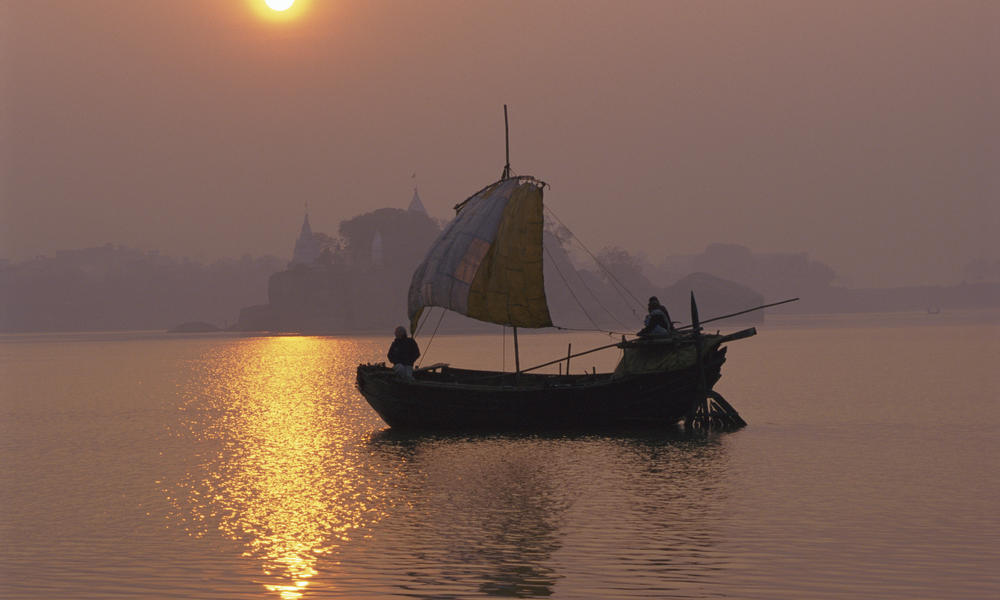SATYAVATI
Bhiṣma continued, “Satyavati would
become a second mother to me. She had been born of a forest sage and a river
mermaid then left to die on the banks of the river. The history of this great
queen was not fully known to me until later, when it was my duty to continue
the dynasty of the Kurus. At that time she confided in me the entire story of
how she had met the sage Parashara, and how the island-born Vyāsa, compiler of
the Vedas, had been born to her. Now I will tell the story of Satyavati, my father's second wife.
“By the good fortune of Kṛṣṇa and
the gods, Satyavati was saved by a fisherman and raised as his daughter. She was a mere girl who ferried passengers
across the Ganges in a small boat, built for the purpose. She was a nubile maid,
a child of the river.
| Satyavati crossing river. |
“Her
father, a crafty fisherman had raised her to ferry passengers across the
Ganges. As she lived in a bamboo shack beside the river with her father, she
spent every morning cutting and scaling fish. After morning duties, she ran the
ferry.
Now it came to pass that one morning a great saint by the name of
Parashara Muni had to cross the river.
Now Parashara had spent a long time in
the mountains meditating on the nature of the absolute and had not seen a woman
during his time there. When he came upon this innocent girl, he was stunned by
her beauty and determined to lay with her.
“Satyavati,
of course, had never considered herself a great beauty, for everyone insulted
her and called her foul-smelling and 'fish-breath'. In truth, her mother had
been a beautiful water-sprite of the river, an apsara, a kind of mermaid. How
could she understand the attractive power of her beauty and the madness it
would provoke in a saint? As the boat entered the smooth waters of the Ganges, Parashara,
beholding her nymph-like charms, approached her gently, saying, “Oh divine
nymph, come to me. Allow me to embrace you and let us know the joys of mortal
love together.”
The young Satyavati was furious at
the forest sage whose green eyes had a penetrating and hypnotic stare. She
laughed at him and made as if to strike him with an oar if he came any closer.
“Stay away from me,” she said.
| Parasara Muni and Satyavati |
“I have acquired certain mystic
powers by dint of my long years of penances and austerities in the mountains of
the Himalayas.” He said. “Tell, me, what is your heart’s desire?”
“No closer.” she said.
“I can grant you a boon or
benediction as you wish.” He said. “Don’t be afraid of me.”
“Well, if you really have any
mystic powers at all,” she said, softening “Make me fragrant. The fishy smell
that permeates me offends all suitors and young men everywhere. Please help me. I have lived so long in the
house of a fisherman that I smell like a fish and no one will touch me.”
“Done.” He said, and her new aroma
of sandalwood and roses permeated both sides of the river with a strange and
lovely perfume for eight miles in all directions.
“What more do you ask of me,” said
the sage, moving closer, with his strange visage and matted hair, dressed as he
was in a deerskin. “Come to me.” he gestured to her.
“Satyavati Fault Lines VIII" Karthika Naïr |
“Well, if we are to know the joys
of mortal love, transform yourself into a handsome young man in fine clothes.”
she challenged.
| Parasara Muni |
“Done,” said the mystic and assumed
temporarily the aspect of a handsome young man in fine clothes. “So now leave
the oars. Come to me.”
“We shall be seen!” she exclaimed,
at once alarmed and attracted. “My reputation will be ruined.”
“I’ll see to that.” He said, and so
a fine mist began to pervade the atmosphere of the river. Their boat stopped
dead in the water, it floated into a vast clump of golden lotus flowers. The
fragrance of Satyavati changed with her mood and she now exuded the scent of
jasmine flowers in the sunset.
She smiled, coyly. “If I fall into your
embrace,” She said, then I will no longer be a virgin.”
“Then“ the sage smiled, “By the
mystic power of the great yogis achieved after long penance and austerities - I
shall restore your virginity.”
“Can such a thing be done? What if
I am with child?”
“Your child shall be born
immediately. We shall leave him on yon island. His name will be Vyāsa and he
will be the greatest of sages and the writer of the Vedas. His dynasty shall
rule the earth. What more would you ask?”
"She smiled, her objections
overcome. They embraced in the cool privacy of the scented mist.
When they reached the other side of
the river, the saint Parashara once more assumed his normal appearance, an old
man with matted hair in a deerskin. He again retired to the mountains of the
Himalayas to pass a long time in meditation."
 |
| Riverboat,Ganges |
"The river-born Vyāsa was left on an
island where he was later found and raised by river spirits and mountain sages.
Satyavati was now a woman and her beauty famous. Not only were her eyes pure,
her form shapely, but her perfume, which changed with her mood, was now
redolent of sandalwood, then jasmine, and then the musky aroma of lotuses at
sunrise."
| From Mahabharata TV Mini Series: Sayantani Ghosh as Satyavati |
And so it was that my father,
childless and forlorn, having conquered vast lands beyond his own kingdom, met
and fell in love with the beautiful Satyavati. Upon crossing the river he was
utterly enchanted and lost his wits in the charms of love.
| King Shantanu and Satyavati |
